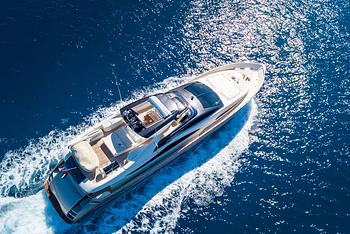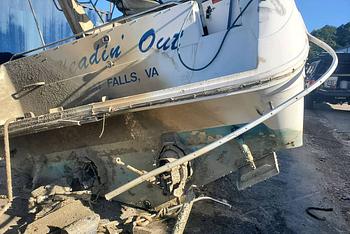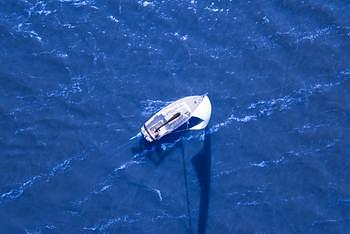Buying a boat is an exciting time, but it can also feel daunting. How do you know you’re buying the right boat? It’s the most frequently pondered question, and justifiably so. Boats are often a major investment, and you want to get it right. Whether you’re buying a new boat or a used boat, the process is virtually the same, although there are some extra steps and considerations to take when buying a used boat. Begin your boat-buying journey with our in-depth and step-by-step Guide to Buying a Boat. Once you’ve narrowed down your options and it’s time to view some boats, you’ll want to go prepared. Here are some of the top questions you should be asking yourself, a broker, or a private seller.

Once you’ve narrowed down your options and it’s time to view some boats, you’ll want to go prepared and ask all the right questions.
Questions to Ask Yourself
- Why do I want a boat and what does it need to do? It’s the most important first question to ask yourself. Narrowing down the reasons you want a boat will go a long way to helping you work out which is the best boat for you. Do you want to go fishing with a friend on the lake? Do you want to enjoy weekends cruising coastally? Or do you need something the whole family can enjoy but will fit on a trailer in the yard? Boats fulfill quite specific functions, so there is sure to be the right one for your needs.
- What is my budget and can I afford the upkeep? Owning a boat is an on-going expense and so you need to look far beyond the initial purchase price. As a rough and general rule, you’ll need to budget for 10 percent of your boat’s purchase price in annual maintenance costs, insurance, storage, and taxes. See our guide on the Real Costs of Owning a Boat for more information.
- Should I buy a new or used boat? There are many pros and cons to buying both new and used boats, but perhaps the biggest tradeoff is the warranty that comes with a brand new boat versus the cost difference of a used boat. You may very well get a better model or a bigger boat for your money buying used, but you won’t be getting the same peace of mind that a new boat can offer.
- Where will I keep it? Making sure you have somewhere to store your boat year round is something that needs doing long before you sign on the dotted line. You might want a boat small enough to be kept on the driveway and trailered, or if you choose a larger boat you’ll need to look into in-water storage in a marina, outdoor self-storage, or dry-stack storage. Each has its own pros and cons so look into what’s available in your area and decide what will work best before buying the boat.
- Am I experienced enough for the type of boat I want to buy? This is a case of being completely honest with yourself. Buying a boat—whether it’s a sailboat or motorboat—that’s too big or too powerful for your experience level is likely to overwhelm you. Of course you can overcome that hurdle by taking courses to further your training and give you confidence. However, it’s advisable to buy a boat that’s within your comfort zone so you can enjoy it to the fullest.

Making sure you have a place to store your boat all year round is something that must be considered before closing the purchase.
Questions to Ask a New Boat Dealer
- What kind of warranty does the boat have? One of the biggest pros of buying a brand new boat is the peace of mind that a warranty brings. Standard manufacturer warranties will usually cover your new boat against defects, both in materials and construction, including things such as steering systems, and electrical and plumbing systems. Extended warranties, however, can be negotiated or purchased, to protect your boat for longer. It’s important to see the fine print and ask exactly what is covered and for how long.
- What are the standard and optional extras? When viewing a new boat, you need to make sure you know what comes included in the basic model, and what are optional extras. When you see a display boat, it may have been equipped with fishing gear, a watersports tower, and high end upholstery that are in fact charged extra. It’s common to choose from a list of options for your new boat, from the engine size to the electronics on board, so sit down with the boat dealer and make sure you know exactly what’s included before signing on the dotted line.
- What finance options are available to me? Buying a boat is a big financial decision, and many people choose to spread the cost over a few years by using boat finance options. Brokers and dealers can offer good on-site loans and finance options so it’s certainly worth asking the question and comparing the numbers with other lenders. For a more in-depth look at your options, see our guide on How to Finance a Boat.
- How fuel-efficient is the boat? While it’s not necessarily a make-or-break factor, knowing the fuel efficiency will help you to decide if this boat is right for you and whether it fits within your annual budget. Fuel efficiency isn’t an exact science and can vary depending on factors such as your driving style, total load, or the typical tides and current. Nonetheless, a broker should be able to give you a good ballpark figure for a new boat.

When looking at a new boat, make sure you know what the basic model includes and what the optional extras are before you sign on the dotted line.
Questions to Ask a Broker or Private Seller Selling a Used Boat
- Why is the boat being sold and how long has the current owner had it? This is an important question to ask, although you’ll never know for certain if what you’re being told is the full story. It might be a simple case of the owner upgrading to a larger boat, or someone having passed away and the family no longer using it. More vague answers, however, such as “We just don’t get enough use out of it,” may very well be genuine, but might also be taken with a pinch of salt. Asking how long the owner has had the boat sometimes sheds some light on the situation. If they’ve had it for a short amount of time and are selling without what seems to you a logical reason such as, “At 15 feet, it was too small for our family of six,” then you may be hearing an alarm bell ringing.
- Is the boat still under warranty and is it transferable? Depending on the age of the boat, it might still be within its warranty, which is a valuable document to have in your possession. Ask whether it a) still has a warranty, b) how much time is left on the warranty, c) what the warranty covers, and d) whether the warranty is transferable to the new owner, i.e. you. Boat warranties should be transferable if handled through the correct channels, likely the manufacturer. Some boat dealers also offer limited-time warranties.
- Where has the boat been stored? Knowing where a boat has been stored will give you insight into its maintenance schedule and therefore its overall condition. Boats stored outside in the water are likely to have suffered more wear and tear than those stored in dry, covered conditions. The effects of salt water, freezing water, and the weather can cause corrosion and damp, amongst other issues. That doesn’t mean you should never buy a boat stored in the water—indeed one could argue that it may have been kept there because it was used more and therefore was maintained better, or perhaps it’s a plank-built wooden boat kept in the water under a custom-fit cover during winter months. But regardless of the story, where the boat was store may give you good reason to look further into its condition and negotiate the price accordingly. Use our Boat Inspection Checklist or Guide to What to Look for When Buying a Used Boat to help you.
- Can I have a marine survey and sea trial? A sea trial is essentially a test drive of a boat. It gives a prospective buyer the chance to see the boat in action, try out the equipment and instruments, get a feel for the boats’ maneuverability, and usually to take along a surveyor. In fact, a sea trial is often conducted on the same day as a marine survey for that reason, and the surveyor will include the sea trial as part of their report. A seller should always be open to a sea trial, however, if the boat hasn’t been used and isn’t insured they may understandably be more reluctant. Then again, you wouldn’t buy a car, or even a bicycle, without testing it out first so do so before buying a boat if it’s at all possible. For more, see our Guide to Sea Trials.
- How many hours does the engine have logged and when was it last serviced? A good service record is worth its weight in gold when buying a used boat, and that’s especially the case when it comes to the engine. Ask how many hours the engine has logged and when it was last serviced (as well its regular service program). Boats log their engine use as hours used, rather than the distance in cars. Working out what is considered high or low annual engine hours depends on the age of the boat. What is high for a three-year-old boat might be considered low for a 10-year-old boat.
- What’s included in the sale? What you see isn’t always what you get. While we always recommend sellers remove anything that isn’t included in the sale of the boat before showing the boat, not everyone does. Be sure to ask exactly what is included, from the soft furnishings to the electronics and safety equipment. The seller should be able to supply you with a detailed list of what is and isn’t included in the sale.

Although you will never know for certain if you are being told the truth, it is important to ask why the boat is being sold and how long the current owner has owned it.




